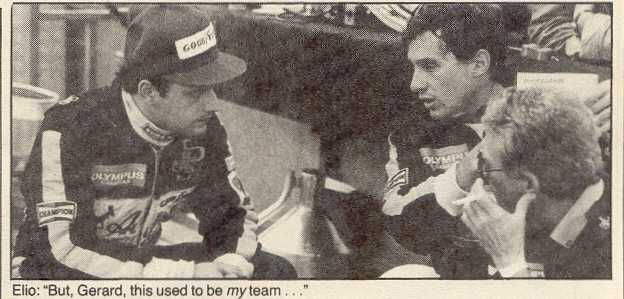
Away from a race track, Ayrton Senna is a different man. Not that he ever stops thinking about racing, you understand, just that a sense of humour emerges. The normal human being behind the racing driver. Prost believes that his driving improved immeasurably when he managed to bring other things into his life, put cars from his mind for a while. If Senna ever manages to do that, the rest are in for a very thin time.
Elio de Angelis could see, by the beginning of the 1985 season that John Player Special Team Senna was taking shape, but initially he responded to this new challenge far more effectively than I expected. To qualify ahead of Ayrton at Rio was, in itself, a remarkable achievement and a big psychological point. And through the first half of the season he kept in reasonable touch with his new hot-shoe team mate, where one might have expected him to wilt. At Montreal, indeed, he even beat Senna to the pole.
Eventually during the later races, though, he did become demoralised and the gap between them widened. Elio was clearly not enjoying his motor racing very much by this stage. He said: “I know now how Mansell felt last year” — and it was no surprise when he finally sought new employment, after six years. De Angelis is a beautiful stylist in a racecar, and very, very, quick when all is right. I still believe he has talent to throw away, and that he makes full use of it only occasionally. He is not at his best in a battle — I would have bet my house on Johansson passing him on the last lap at Ricard — but I still see him as a man who, in the right circumstances, could win races going away. His only victory in 1985, at Imola, was inherited after Prost had been disqualified. With fluctuating boost he drove a cautious race, and so his fuel lasted and he made the finish. If Gordon Murray’s radical BT55 is up to snuff, envisage a lot of success for Elio.
Three wins for lotus, and their best season since 1978. Ducarouge’s 97T, a further refinement of his very fleet 95T, invariably handled beautifully, but Renault unreliability let it down frequently. There could, and should, have been more victories, however. I agree with Peter Warr’s sentiments, expressed after Imola, that Formula I and fuel economy are strange and unnatural bedfellows, but as Jimmy Durante used to say, “Dese are de conditions dat prevail.” And in the circumstances, it was extraordinary that Lotus drivers had neither fuel monitor nor radio link to the pits available until well past half-season.
